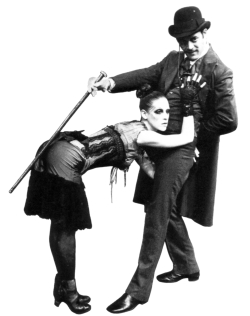
Yesterday I was reading through a collection of mediæval verse when, in the section on the 15th-century poet and scalawag François Villon, I came across two poems that were remarkably similar to two songs in Brecht and Weill’s Threepenny Opera. I did some googling, and yes, this is well-known (and Brecht apparently borrowed more than just the two I’d found), but it was news to me.
Compare this Villon poem:
What though the beauty I love and serve be cheap,
Ought you to take me for a beast or fool?
All things a man could wish are in her keep;
For her I turn swashbuckler in love’s school.
When folk drop in, I take my pot and stool
And fall to drinking with no more ado.
I fetch them bread, fruit, cheese, and water, too;
I say all’s right so long as I’m well paid:
“Look in again when your flesh troubles you,
Inside this brothel where we drive our trade.”But soon the devil’s among us flesh and fell,
When penniless to bed comes Madge my whore;
I loathe the very sight of her like hell.
I snatch gown, girdle, surcoat, all she wore,
And tell her, these shall stand against her score.
She grips her hips with both hands, cursing God,
Swearing by Jesus’ body, bones, and blood,
That they shall not. Then I, no whit dismayed,
Cross her cracked nose with some stray shiver of wood
Inside this brothel where we drive our trade.When all’s up she drops me a windy word,
Bloat like a beetle puffed and poisonous:
Grins, thumps my pate, and calls me dickey-bird,
And cuffs me with a fist that’s ponderous.
We sleep like logs, being drunken both of us;
Then when we wake her womb begins to stir;
To save her seed she gets me under her
Wheezing and whining, flat as planks are laid:
And thus she spoils me for a whoremonger
Inside this brothel where we drive our trade.Blow, hail or freeze, I’ve bread here baked rent-free!
Whoring’s my trade, and my whore pleases me;
Bad cat, bad rat; we’re just the same if weighed.
We that love filth, filth follows us, you see;
Honour flies from us, as from her we flee
Inside this brothel where we drive our trade.
with this Brecht song:
or likewise this Villon poem:
Rain has unsmirched and washed us
And the sun has dried and blackened us;
Magpies and crows have carved out our eyes,
And torn off our beards and eyebrows.
We never sit for a moment;
Now here, then there, as the wind changes,
at its pleasure, without cease it tosses us,
More pecked by birds than thimbles,
Do not then be of our brotherhood,
But pray God that he wills to absolve us all! …Human brothers who live after us,
Do not have your hearts hardened against us,
For, if you take pity on us poor fellows,
God will sooner have mercy on you.
You see us tied here, five, six:
As for the flesh, that we nurtured too much,
It is already long-time consumed, and rotting,
And we, the bones, become ashes and powder.
Of our pain let no one make fun,
But pray God that he wills to absolve us all!
with this Brecht song:
I’ve used the Threepenny Opera versions from the excellent Raul Julia stage production (not to be confused with the sadly unbearable Raul Julia movie version) because the translations are more accurate than most.

Here’s another version of the “Zuhälterballade,” featuring Alan Cumming and Cyndi Lauper. This translation is in some respects more accurate, and in other respects less accurate, than the Raul Julia / Ellen Greene version above:
While I’m on the subject of Threepenny Opera, I can’t resist adding this performance of “Seeräuber-Jenny,” by Anne Kerry Ford. This song has nothing to do with Villon, and the translation is not terribly accurate, but Ford’s performance is amazing:
For comparison, here’s the Ellen Greene version – a more accurate translation, and an excellent performance, but not quite as excellent as Ford’s:
